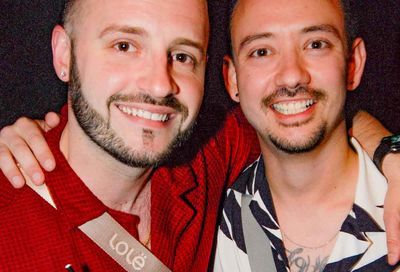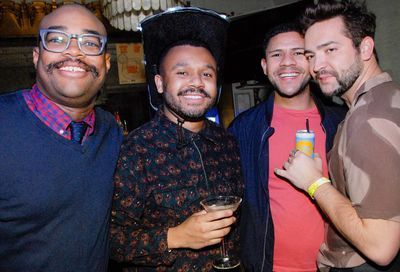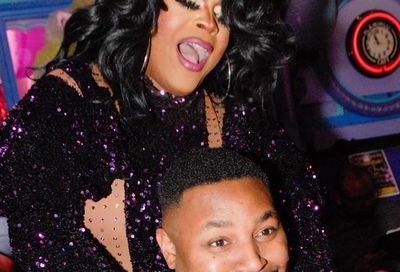Debatable Success: Clinton versus Sanders at the first debate
CNN’s Democratic debate was the perfect antithesis to the circus antics of the prior two GOP affairs

What a difference a day makes. Or, rather, what a difference four weeks, restrained set design, competent moderation, and refined, respectful candidates can make. This week’s Democratic Party debate may not have had the same degree of excitement and newsworthy bickering that has defined its Republican counterparts, but as an actual debate, it was leagues better than the pandering mess of Fox News or the quixotically unmoderated CNN debate last month.
Anderson Cooper is to thank for its success. Unlike Fox News, who moderated well but threw ludicrously softball questions to candidates not named Trump, or CNN’s own Jake Tapper, who could have watched from home and had the same impact on the GOP field, Cooper maintained a vice-like grip on proceedings — only occasionally relinquishing it to offer other moderators the spotlight. If this is the standard for the debates moving forward, it’s something we’ll all benefit from, as Cooper wasted no time in fact-checking candidates or pressing them for answers — though there’s legitimate concern that CNN gave Hillary Clinton and Bernie Sanders vastly more time to talk than the other candidates.
It’s also somewhat telling, especially in comparison to Republicans, that LGBT issues were essentially a footnote in this debate. Unlike their GOP competitors, support for same-sex marriage, transgender rights, nondiscrimination and other factors are tacitly implied: Democrats support the LGBT community. Clinton affirmed as much during her opening statement as did Martin O’Malley in his closing, but that’s about as much as it was discussed. It’s somewhat disheartening CNN didn’t allow candidates to offer counterparts to GOP arguments against transgender servicemembers, or the threat of religious freedom laws, but there are several debates still to come.
Instead — and, really, thankfully — this was a debate about the issues.
In that context, Clinton was arguably the strongest candidate on the stage. With the most to lose coming into this debate, the former Secretary of State had to convince voters that she was still the party’s best candidate to challenge a Republican opponent. With polished, confident delivery and strong command of her own policies, Clinton set forth the terms of her presidency to repeated applause from the audience. Challenging views that her political career has been one of flip-flopping between the issues depending on public support, Clinton stuck to previous assertions that her positions constantly evolve, saying: “I have been very consistent,” she said. “Over the course of my entire life, I have always fought for the same values and principles, but…I do absorb new information.”
Not that she was given an easy ride on other matters. Her email scandal inevitably cropped up. Clinton stated she had been “as transparent as I know how to be” — a very carefully chosen answer — before iterating that she wanted to “talk not about my emails, but about what the American people want for the next president of the United States.”
It was here that Vermont Senator Bernie Sanders came to Clinton’s aid — perhaps to the surprise of some, but not to those who’ve watched him consistently chastise the media for focusing on scandal rather than the issues. Responding to Clinton, Sanders stated: “Let me say something. I think the secretary is right. And that is that the American people are sick and tired of hearing about your damn emails!” It was enough to draw a big laugh from Clinton and a standing ovation from the audience.
Clinton, however, pulled no punches in asserting herself as a more electable version of Sanders. (“I’m a progressive, but I’m a progressive who likes to get things done,” she quipped.) When asked if Sanders was tough enough on gun control, Clinton forcefully responded, “No. Not at all. We have to look at the fact that we lose 90 people a day from gun violence. This has gone on too long and it’s time the entire country stood up against the NRA.”
Sanders, who has previously opposed gun control measures due to attitudes in rural Vermont, found himself on the defensive against a more liberal opponent — something that can’t often be said for the Democratic Socialist. “We can raise our voices,” he said. “But I come from a rural state, and the views on gun control in rural states are different than in urban states, whether we like it or not.”
Clinton was also predictably taken to task for issues that have put her at odds with the Democratic base. On Iraq, which Sanders called “the worst foreign policy blunder in the history of this country,” Clinton was attacked for voting in favor of the war. “There was no real evidence of weapons of mass destruction in Iraq,” said former Rhode Island Governor Lincoln Chafee. “I know because I did my homework.” Clinton couldn’t be shaken, however, instead spinning the attack into a defense of her strong record on foreign policy.
“After the election, [President Obama] asked me to become Secretary of State. He valued my judgment,” she said, before reiterating her policies on Syria, ISIS, her role in capturing Osama bin Laden and the stance she’d take with Russia’s President Putin. When former Maryland Governor Martin O’Malley tried to attack Clinton on being too quick to use military intervention, she slapped him down. “I was very pleased when Governor O’Malley endorsed me for president in 2008,” she said with a smile, “and I enjoyed his strong support in that campaign.”
Clinton was also, predictably, strong on women’s issues. On her Washington insider status — considered by many to be poisonous in this campaign — she retorted: “I can’t think of anything more of an outsider than electing the first woman president.” She also used Planned Parenthood to contrast the Democratic field with their Republican counterparts: “They don’t mind having big government to interfere with a woman’s right to choose and to try to take down Planned Parenthood,” she said, to loud cheers and applause. “They’re fine with big government when it comes to that. I’m sick of it.”
For Sanders, last night was more of what the liberal Senator has become known for: impassioned speeches, off-the-cuff remarks, factual arguments, and ideological rants. The same charisma that has filled venues across the nation spilled over the CNN stage, offering a counterpart to Clinton’s carefully refined poise.
Sanders took big swipes at corporate America and class inequality. The irony of his railing against “the casino capitalist process” while standing in the Wynn in Las Vegas wasn’t lost, but his attacks on Wall Street, the hoarding of money by the richest one-percent, and the incredible inequality in American society played into the hands of the party’s liberal base. It also offered a chance for Sanders to combat smear tactics against his Democratic Socialist ideology.
“What Democratic Socialism is about is saying that it is immoral and wrong that the top one-tenth of 1 percent own 90 percent,” he thundered, before stating his affinity for Nordic nations and their liberal attitudes towards welfare and social care. “Those are some of the principles that I believe in, and I think we should look to countries like Denmark, like Sweden and Norway and learn from what they have accomplished for their working people.”
Clinton quickly stepped in to retort: “We are not Denmark…. We are the United States of America. And it’s our job to rein in the excesses of capitalism so that it doesn’t run amok.”
Sanders also appealed to those disaffected with current foreign policy, while defending his decision to conscientiously object to the Vietnam War. “I am not a pacifist, Anderson. I supported the war in Afghanistan,” he said. “I happen to believe from the bottom of my heart that war should be the last resort that we have got to exercise diplomacy.”
He also had arguably the strongest answer when asked about the Black Lives Matter movement. “Black lives matter,” he stated emphatically. “On any given day some innocent person like Sandra Bland can get into a car, and then three days later she’s going to end up dead in jail…. We need to combat institutional racism from top to bottom.”
The issue also gave O’Malley the opportunity to defend against criticisms of his stewardship during the Baltimore protests. “When I ran for Mayor of Baltimore…we were burying over 350 young men every single year, mostly young, and poor, and black,” he said. “I said to our legislature…that if we were burying white, young, poor men in these numbers we would be marching in the streets and there would be a different reaction.”
Indeed, O’Malley had a few choice moments during the debate, such as calling Donald Trump “that carnival barker,” but particularly on climate change. The entire Democratic field supports efforts on climate change (“the fossil fuel industry is funding the Republican Party,” railed Sanders), but O’Malley has used the strongest rhetoric, demanding that we move “to a 100 percent clean electric energy grid by 2050” — promising that it would be the first order he signed in office.
However, he struggled against Clinton and Sanders. His liberal politics are overshadowed by Sanders, while Clinton ran rings around him in foreign policy. Attempts to attack the latter on Syria fell flat, after his question of whether she underestimated the Russians gave Clinton carte blanche to put forward her own policies, rather than let O’Malley state his own. He did, however, have perhaps the strongest closing statement of the night.
“On this stage, you didn’t hear anyone denigrate women, you didn’t hear anyone make racist comments about new American immigrants, you didn’t hear anyone speak ill of another American because of their religious belief,” he said. “What you heard instead on this stage tonight was an honest search for the answers that will move our country forward.”
Conversely, neither Lincoln Chafee nor former Virginia Senator Jim Webb provided voters enough reason to elevate them from their meager positions in the polls.
Webb was arguably the more confusing candidate, with many of his policies and ideals speaking more to moderate Republicans than Democrats. He also found himself on awkward footing when discussing issues of race. Asked whether he was out of step with the party for his opposition to affirmative action, something he’s called “state-sponsored racism,” Webb responded that he supports it for African Americans, but not “everyone, quote, ‘of color,’ other than whites.”
Webb spent most of his time on stage complaining that he wasn’t given enough time to speak. He wasn’t incorrect — estimates put him and Chafee last that regard — but whining to Cooper did little to make him seem presidential.
“This debate…is kind of frustrating because unless somebody mentions my name I can’t get into the discussion,” Webb complained.
“You agreed to these rules and you’re wasting time,” Cooper snapped back.
Chafee, meanwhile, offered occasionally thoughtful responses and took swipes at Clinton by espousing his 30-year career with “no scandals.” However, he derailed any momentum with bizarre responses to questions.
Asked whether he could be trusted by voters, given he’d switched from Republican to Independent to Democrat — the latter occurring just two years ago — Chafee called himself “a block of granite when it comes to the issues.”
“It seems like pretty soft granite,” Cooper responded.
Later on, when asked about Glass-Steagall, Chafee defended voting to remove it because his father had died. “[It] was my very first vote, I’d just arrived, my dad had died in office,” he said.
“Are you saying you didn’t know what you were voting for?” Cooper asked.
“I’d just arrived at the Senate. I think we’d get some takeovers, and that was one,” Chafee responded, to little enthusiasm from the audience.
If viewers didn’t like Hillary before the debate, her performance is unlikely to have changed any minds, but it will certainly boost her flagging campaign and have appealed to unsure voters. Sanders was able to present himself to his widest audience yet and took full advantage of the opportunity — though his liberal policies are still at odds with more moderate parts of the Democratic base. If this week’s debate was the standard bearer for those moving forward, however, and if Webb and Chafee drop out to allow the other three candidates to breathe more and go deeper, the next debate on November 14 is certainly one to look forward to.
Support Metro Weekly’s Journalism
These are challenging times for news organizations. And yet it’s crucial we stay active and provide vital resources and information to both our local readers and the world. So won’t you please take a moment and consider supporting Metro Weekly with a membership? For as little as $5 a month, you can help ensure Metro Weekly magazine and MetroWeekly.com remain free, viable resources as we provide the best, most diverse, culturally-resonant LGBTQ coverage in both the D.C. region and around the world. Memberships come with exclusive perks and discounts, your own personal digital delivery of each week’s magazine (and an archive), access to our Member's Lounge when it launches this fall, and exclusive members-only items like Metro Weekly Membership Mugs and Tote Bags! Check out all our membership levels here and please join us today!





















